Baños, Ecuador
[by Jeremy]
Like so many other travellers, we have, over the past few months, often waxed lyrical about Colombia’s natural beauty – its stunning landscapes, its warm people, its incredible coastline, its deserts, mountains, not forgetting its delicious arepas con queso.
Unlike most other travellers we are fortunate enough – if that can ever be the right word – to have been able to lift the veil of normality, to scratch below the surface of the glossy tourist brochures and to experience a small part of the reality of the Colombia in which many millions of poor, displaced and victimised Colombians are forced to live.
Maybe partly through our own fear, or for the sake of some of those we met, we decided to wait until we had left the country before writing this blog. That in itself speaks volumes about the situation.
For 10 years before this trip I travelled to Colombia helping to expose the human stories behind the grim statistics. I have been present when mass graves of alleged ‘false positives’ – young men from among the urban poor who had been kidnapped by the army, murdered, dressed in guerilla uniforms and buried in rural areas far from prying eyes – were uncovered. I have met these young men’s mothers and heard first hand of the persecution they face simply for seeking the truth about their sons’ murders.
I have helped document testimonies from peasant farmers in Meta province about the human rights abuses suffered by whole communities at the hands of the army and the right-wing paramilitaries – and forced back a tear when two weeks later their spokesperson was assassinated in front of his family. I have been in to the women’s prison in Bogota to meet with young women living in insanitary conditions, with eight to a room designed for four, who are denied visits from friends and family, sometimes even their own children. These women and many more – among them teachers and community workers – are arrested and detained often for years at a time, without trial in flagrant breach of international human rights laws.
Colombia is a country not only rich in natural beauty, it is a rich country, full stop. Boasting reserves of the majority of the world’s most valuable natural resources, Colombia exports petroleum, coal nickel, gold, copper, iron ore, bananas, cut flowers, sugarcane, natural gas and over half of the world’s emeralds. Colombia also boasts the most uneven income distribution in the whole of Latin America.
Many millions of Colombians live in poverty. Millions are denied healthcare, millions live without clean water, millions live below the poverty line – and for those journalists, peace campaigners, trade unionists and indigenous rights activists, who expose such realities or stand up to the onward march of the multinationals, against privatisation of basic services, or who defend land and speak out for the peasants and the urban poor, the full force of a vicious, neo-liberal regime and a brutal paramilitary movement – aided and abetted by sections of the state, army and police – is brought down upon them.
These aren’t mere fantasies. 60% of all the trade unionists killed in the world are killed in Colombia. Around 200 trade unionists are currently classified as ‘disappeared’. Colombia now has the highest number of internally displaced people in the world – around 5,000,000 – mostly the result of land seizures. 230,000 people were forced to flee their homes last year alone. There are more than 5,600 political prisoners, many languishing in appalling conditions in overcrowded jails – mainly opposition politicians, trade union leaders and community activists. In recent years (2002-2010) an average of 4,368 people have been killed or disappeared in combat and conflict-related violence each year – around 12 people per day. And at the heart of Colombia’s human rights crisis is the issue of impunity. According to the UN, in 98.5% of cases of extra-judicial executions carried out by the army, no-one has been brought to justice. In 98% of the cases of killings of journalists and trade unionists the perpetrators have never been charged.
Colombia has among the highest number of forced disappearances in the world – with approximately 30,000 people currently believed to be disappeared. The state security forces are responsible for the vast majority of disappearances. The Colombian Commission of Jurists (CCJ) state that “public functionaries are compromised in one way or another in around 97% of these cases.
“Few stories of bravery and resilience in the face of abuse, torture and intimidation can surpass that of my old friend Claudia Julieta Duque.”
Even the space for democratic participation in Colombia is severely limited. In most elections, even today, large numbers of votes are simply bought. In recent years the paramilitaries – in what is now known as the para-political scandal – have played an increasingly pivotal role in delivering elections for their favoured candidates by, for example, ensuring the other candidates on the ballot are threatened into pulling out. The paramilitaries also poured millions of dollars in to funding electoral campaigns, leaving the successful candidates indebted to them rather than to their electorate. More than 50 members of the 2006-10 Congress are currently facing trial as a result of accepting bribes from paramilitary organisations.
In my years of travelling to Colombia I have met some of the most inspirational people I will ever meet. People who in the face of such injustices and terror continue to expose the truth, stand up for economic and social justice and represent their fellow workers, their communities or simply their beliefs.
In Bogota, just a few weeks ago, we interviewed the lawyer and sister of a jailed teacher – Omar Combita – for a video to be shown in the UK. Their dignity in the face of the injustice he has faced was incredible. Omar is yet another trade union activist and community leader accused of the catch-all ‘crime’ of ‘rebellion’. He has been imprisoned for over 18 months – without trial. He has been denied medical assistance despite suffering from the early symptoms of Parkinson’s. The evidence against him has been changed twice and he has been denied due legal process.
He and his family continue to fight, with dignity, for justice.
But few stories of bravery and resilience in the face of abuse, torture and intimidation can surpass that of my old friend Claudia Julieta Duque. Whilst her bravery as an independent journalist exposing human rights abuses has won her numerous international awards, it is only up close you can understand the true horror of what she and her amazing daughter have been through.
We stayed with them in Bogota. Claudia couldn’t come out and meet us or go for a drink or even walk to the shop with us. She lives under a constant death threat from paramilitary groups. She lives in a gated apartment complex, hidden away behind an armoured front door with locks like Fort Knox. There is a TV in her living room but it doesn’t show films or comedies or sport. It relays images from the security cameras which survey the inside and outside or her home. When she does go out she cannot walk, instead she has to drive her armour-plated car with bullet proof glass.
For Claudia though, life is better than it was. In Claudia’s case such improvements are relative.
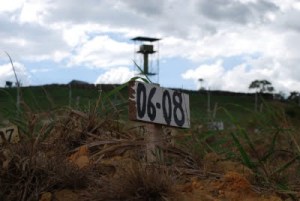
The ‘false positives’ scandal saw poor young men kidnapped by the army, murdered, dressed in guerilla uniforms and buried in rural areas. This grave is one of dozens in the cemetery next to the army base in La Macarena.
Claudia’s crime? She consistently documented and exposed irregularities in the investigation into the murder of journalist Jaime Garzon, including the involvement of the security services in his killing. The threats were designed to silence her. They failed.
Today, while things improve from time to time, Claudia still faces threats, still lives in fear of assassination, and finds it almost impossible to earn a living because of the intimidation. Editors are often too scared to even commission her for fear of the reprisals against them.
I have known Claudia for many years. It is no surprise to me she refuses to be cowed. While we are there her phone rings constantly, talking to journalists in exile, campaigning for recompense for the victims of the conflict, hearing testimony of further human rights abuses, organising to defend a threatened journalist and much more. One call tells her a community leader she interviewed just a few days before has been assassinated, paying the ultimate price for speaking truth to power
The day after we say our goodbyes to Claudia arrest warrants are finally issued against 7 former senior security agents – men at the very top of Colombia’s state apparatus – for the campaign of intimidation against her.
It is a breakthrough after more than a decade of denouncing threats and presenting evidence – but Claudia like so many others knows a long battle lies ahead to actually get a court case, prosecution and some semblance of justice.
Such dreams seem a long way off. Just days later her daughter is photographed up close by an unknown man. Then again when out with her boyfriend. Unknown cars have begun to follow Claudia and her daughter. Claudia’s brother has been receiving intimidating phone calls. The cycle of threat and intimidation has begun again.All Claudia wants, not just for her but for all victims of Colombia’s conflict, is peace – the chance to live her life, work as a journalist. Just the ability to go to the shop, free from fear, for her daughter to enjoy a normal life as a student.
Colombia needs peace. The current peace talks are long overdue. A few days after we left Colombia, civil society took to the streets to demand their voice be heard in those talks.
As Martin Luther King made clear you cannot have justice without peace. And you cannot have peace without justice.
For a fuller briefing on the economic, political and social issues facing Colombia click here.
To find out how you can help click here.
Days: 536
Miles: 17,551
Things we now know to be true: Even bullets cannot silence the voice of the people

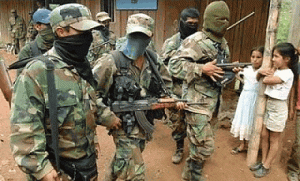
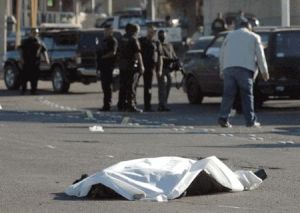
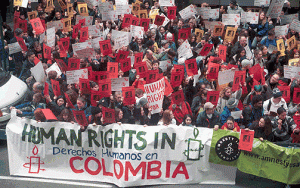


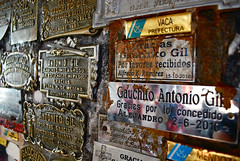


Very impressive story, Jeremy. Working for MSF again now and recently having read HRW report on what’s happening here made me realise again how important it is that the stories of Colombia and the Rohingya’s is being told. Proud of you both for telling this story. Richard.
Wow, that story simply took my breath away. You (Jeremy or Paula?) write with fierce passion and searing intelligence and insight. I am proud to have met you, for even a day, on this journey and I think you two are fearless, forthright and forward thinking………..the story moved me to tears and left me dumb struck……….good on ya both and I will be doing my small part to help……………..Thanks, Gary
Hey Gary, cheers! All credit to Jeremy for that one. Hope you are well. Where’s the next trip going to be? Paula xx
as long as the US is pumping billions of dollars for drugs to south america there will be no peace. On the other hand, things changed A LOT in the past years. You guys would not be here anymore if you have done this trip a decade ago with your car. Things improved a lot, but yes, it’s still far from perfect. Still, we felt very safe in Colombia and we drove into regions were 10 years ago we would not be alive anymore.
I have lots of family in Medellin and when you hear from them how it was 10, 20 years ago you realize how much things improved.
I still would not call Colombia touristic, we hardly saw any tourists compared to other countries.
But all this countries have dark sides, Mexico, central america, Peru etc. We just were in Ayacucho, visited the sendero luminoso victim museum, talked to victims etc.
Which tourist really knows about this dark side of Peru and other countries? Most don’t do…
Thanks for the great text!